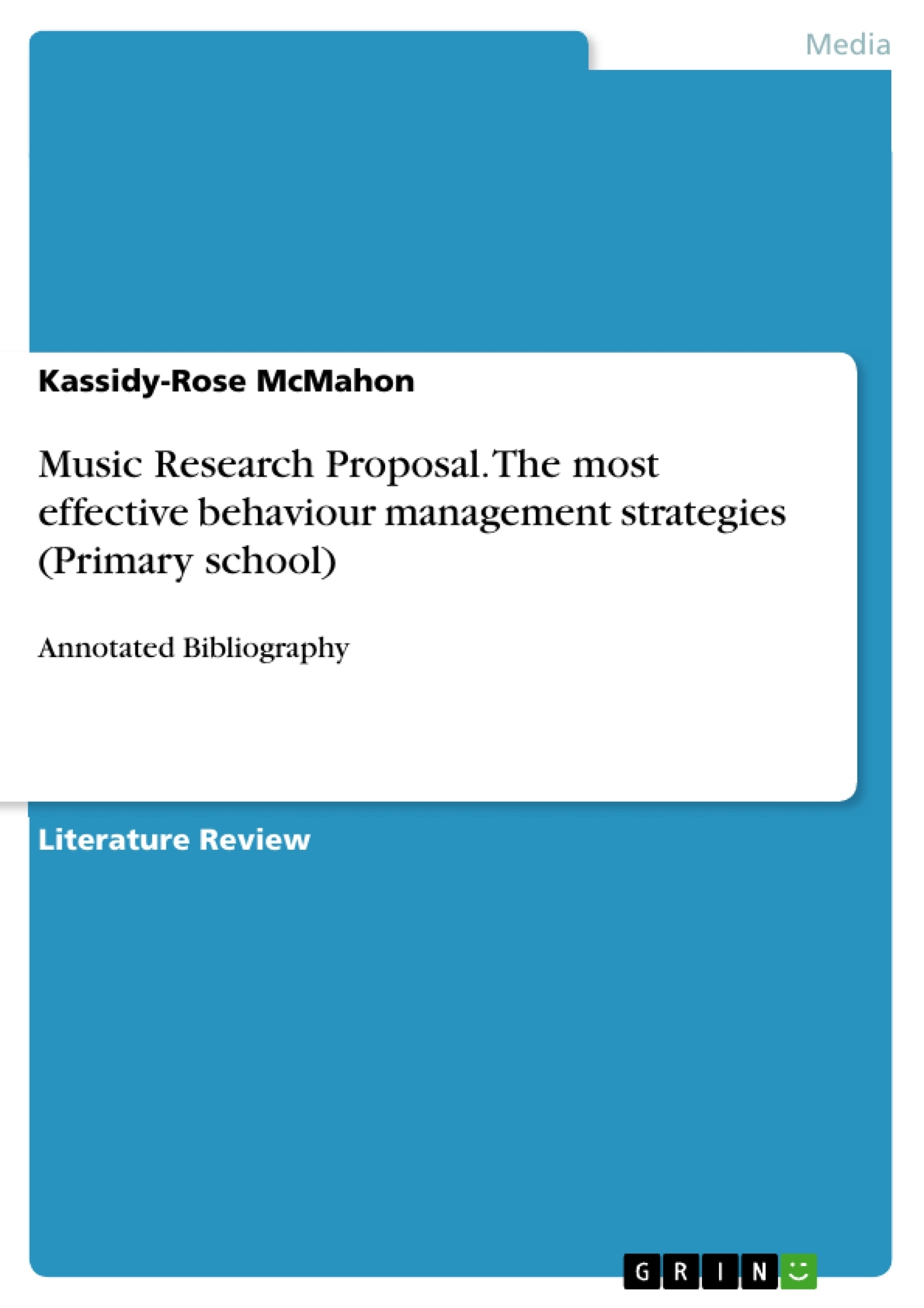This research project will decide the most effective behaviour management strategies for weekly one-hour primary school string orchestra rehearsals, which have a positive impact on learning and musical development.
Inhaltsverzeichnis (Table of Contents)
- Introduction to Music Research: Annotated Bibliography
- Bauer, W. (2001). Classroom management for ensembles.
- Grattan Institute. (2017, February). Engaging students: Creating classrooms that improve learning.
- Hallam, S., & Gaunt, H. (2012). Preparing for success: A practical guide for young musicians.
- Harman, A. (2018). Orchestra Classroom.
- Houlahan, M., & Tacka, P. (2015). Kodály today: A cognitive approach to elementary music education (2nd ed.).
Zielsetzung und Themenschwerpunkte (Objectives and Key Themes)
This research project investigates the most effective behaviour management strategies for weekly one-hour primary school string orchestra rehearsals to positively impact learning and musical development.
- Classroom management techniques for ensembles
- Student engagement and disengagement in music education
- Learning processes and skills development for young musicians
- Integrating technology and innovative teaching practices in orchestra rehearsals
- The Kodály concept and its application in elementary music education
Zusammenfassung der Kapitel (Chapter Summaries)
- Bauer, W. (2001). Classroom management for ensembles. This article explores the importance of proactive classroom management in ensemble settings, emphasizing the role of effective preparation, high-quality teaching practices, and consistent discipline. It provides practical techniques and resources for managing rehearsal time and maintaining student engagement.
- Grattan Institute. (2017, February). Engaging students: Creating classrooms that improve learning. This report investigates student disengagement in classrooms and provides recommendations for creating positive learning environments. It explores the impact of classroom environment on student engagement, identifies challenges faced by teachers, and suggests strategies to minimize disengagement.
- Hallam, S., & Gaunt, H. (2012). Preparing for success: A practical guide for young musicians. This chapter focuses on learning, goal setting, and self-motivation for young musicians, discussing learning processes, the skills needed to become an expert musician, and the development of meta-cognitive skills. It emphasizes the importance of adaptability, flexibility, and well-rounded musicianship in the contemporary music industry.
- Harman, A. (2018). Orchestra Classroom. This blog series offers practical advice for orchestra teachers, covering topics like technology integration, seating plans, warm-up exercises, rehearsal techniques, and classroom management strategies. It emphasizes creating engaging and inclusive rehearsals where all students are actively involved.
- Houlahan, M., & Tacka, P. (2015). Kodály today: A cognitive approach to elementary music education (2nd ed.). This book comprehensively explores the Kodály concept, focusing on building a music curriculum, developing creative expression, teaching music literacy skills, and fostering musicianship. It emphasizes the importance of a developmental, sequential, and continuous approach to music education in the elementary phase.
Schlüsselwörter (Keywords)
This annotated bibliography focuses on key concepts related to effective classroom management, student engagement, learning processes, music literacy, and the Kodály concept, exploring practical strategies and resources for teaching and learning in primary school string orchestra rehearsals.
Frequently Asked Questions
What are effective behavior management strategies for primary school orchestras?
Effective strategies include proactive classroom management, high-quality preparation, consistent discipline, and creating an inclusive environment where all students are engaged.
How does the Kodály concept apply to music education?
The Kodály concept uses a developmental and sequential approach to teach music literacy, creative expression, and musicianship through singing and folk music.
Why is student engagement a challenge in ensemble rehearsals?
Disengagement often stems from poor rehearsal environment or lack of meta-cognitive skills; strategies to minimize this include technology integration and varied warm-up exercises.
What meta-cognitive skills are important for young musicians?
Skills like goal setting, self-motivation, and adaptability are crucial for becoming an expert musician in the contemporary music industry.
How can technology improve string orchestra rehearsals?
Technology can be used for tuning, recording for self-reflection, and providing interactive resources that keep primary school students motivated and focused.
- Quote paper
- Kassidy-Rose McMahon (Author), 2018, Music Research Proposal. The most effective behaviour management strategies (Primary school), Munich, GRIN Verlag, https://www.grin.com/document/437890



